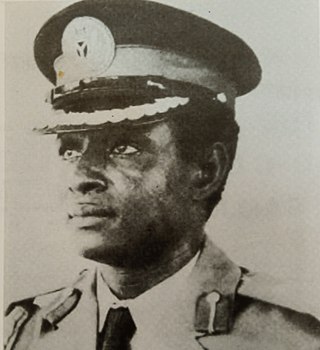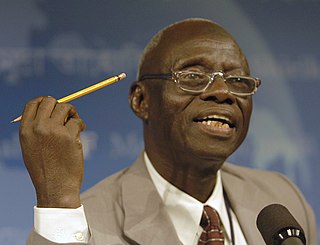
Shehu Musa Yar'Adua ; 5 March 1943 – 8 December 1997) was a Nigerian general and politician who was the de facto vice president of Nigeria as Chief of Staff, Supreme Headquarters when Nigeria was under military rule from 1976 to 1979. He was a prominent politician during the later transition from military to civilian rule in the late 1980s and into the 1990s.

Katsina State is a state in the northwestern geopolitical zone of Nigeria. Katsina State borders the Republic of Niger to the north for 250 km and the States of Jigawa for 164 km and Kano to the east, Kaduna to the south for 161 km and Zamfara to the west. States. Nicknamed the "Home of Hospitality", both the state capital and the town of Daura have been described "ancient seats of Islamic culture and learning" in Nigeria.

Babagana Kingibe OV GCON is a Nigerian diplomat, politician and civil servant who has held several high ranking government offices, culminating in his appointment as the Secretary to the Government of the Federation from 2007 to 2008. He spent over a decade in the Foreign Service cadre and has been in politics since the 1970s, serving six heads of state; most recently as a member of the inner circle of President Muhammadu Buhari.
Alhaji (Dr) Mamman Shata MON was a Nigerian singer.
Mohammed Bello was a Nigerian Jurist who was the Chief Justice of Nigeria from 1987 to 1995.

Adamu Ciroma was a Nigerian politician and Governor of the Central Bank of Nigeria, born to a Bole family in Potiskum, Yobe State. He was a member of the People's Democratic Party.
Mahmud Tukur was a Nigerian politician and former Minister for Commerce and Industry during the military administration of General Muhammadu Buhari. He was the first indigenous Director of the Institute of Administration, Congo, Zaria. He took the mantle from Professor Professor Sam Scruton Richardson in 1967, until 1975 when he became the first Vice Chancellor of Bayero University, Kano. Tukur's enviable position and competence displayed as the Vice Chancellor of Bayero University increased his public profile in Northern Nigeria. He became friends with contemporaries such as Mamman Daura, Adamu Ciroma, Hamza Rafindadi Zayyad to form a small clique of policy advocates in Northern Nigeria. He died on April 9, 2021, at the age of 82 years.

Barewa College is a college in Zaria, Kaduna State, northern Nigeria. Founded in 1921 by British Governor General Hugh Clifford, it was originally known as Katsina College. It switched its name to Kaduna College in 1938 and to Government College, Zaria in 1949 before settling on Barewa College. It is one of the largest boarding schools in Northern Nigeria and was the most-celebrated post-primary schools there up to the early 1960s. The school is known for the large number of elites from the region who attended and counts among its alumni include Tafawa Balewa who was Prime Minister of Nigeria from 1960 to 1966, four heads of state of Nigeria. The school is located along Gaskiya road in the Tukur -Tukur area of Zaria.

Isa Kaita C.O.N., C.B.E., LL.D (ABU), LL.D (BUK), DPA (Oxon) was a Nigerian politician. He went on to hold the chieftaincy titles of the Madawaki of Katsina and later, the Waziri of Katsina. Prior to joining politics, he was a distinguished broadcaster at the BBC.

Turai Umar Musa Yar'Adua is the widow of the former Nigerian president and former Katsina State Governor, Umaru Musa Yar'Adua. She was the First Lady of Nigeria from 2007 until the death of her husband on 5 May 2010.
The Northern People's Congress (NPC) is a political party in Nigeria. Formed in June 1949, the party held considerable influence in the Northern Region from the 1950s until the military coup of 1966. It was formerly a cultural organization known as Jamiyaar Mutanen Arewa. After the Nigerian Civil War of 1967, the NPC subsequently became a minor party.
Lawal Kaita was a Nigerian politician elected on the National Party of Nigeria (NPN) platform as governor of Kaduna State, Nigeria, holding office between October and December 1983, when the Nigerian Second Republic ended with the coup that brought General Muhammadu Buhari to power.
Abdulmumini Hassan Rafindadi is a Nigerian professor of pathology, educational administrator, and pioneer vice chancellor of Federal University, Lokoja, located in Lokoja, Kogi State, Nigeria.
Ibrahim Tahir was a Nigerian sociologist, writer, and politician during the Second Republic and a prominent member of the Kaduna Mafia. Prior to his entry into politics, he was a sociologist who was renowned for his traditionalist conservative views.
Alhaji Gidado Idris, was a Nigerian civil servant who served as the Secretary to the Government and Head of Service of the federation in Nigeria between the year 1995-1999, during the military regime of General Sani Abacha.
Mamman Daura is a Nigerian newspaper editor who edited and later managed the New Nigerian from 1969 to 1975. He is a nephew of President Muhammadu Buhari; and a prominent member of the infamous Kaduna Mafia, a loose group of Nigerian businessmen, civil servants, intellectuals and military officers from Northern Nigeria.
Justice Saddik Abdullahi Mahuta is the longest-serving chief judge in Katsina State, Nigeria from 1991 to 2013, and he administered the oath of office to civilian governors of Katsina State from Alhaji Sa'idu Barda in 1991 to Barrister Ibrahim Shehu Shema in 2011.
New Nigerian was a Nigerian newspaper based in Kaduna.
The Ahmadu Bello University is a public research university located in Zaria, Kaduna State, Nigeria. It was opened in 1962 as the University of Northern Nigeria.






